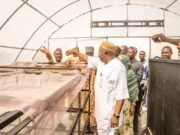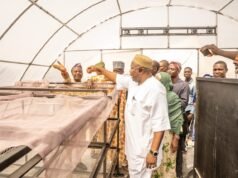Nigeria is inching closer to becoming a net exporter of sugar in the near future. Already, the Federal Government is taking vigorous and credible steps to reverse the trend of weak output which had bedevilled the sugar production sub-sector, including reving up the Backward Integration Policy (BIP) that encourages sugar companies to invest in sugarcane farming and promote domestically produced extracts for their refineries. FRANCA OCHIGBO reports.
The Federal Government in unrelenting in its resolve to achieve self-sufficiency in sugar production and export. It has continued to take steps through its National Sugar Master Plan (NSMP) aimed at attaining self-sufficiency in sugar production through the Backward Integration Policy (BIP) that encourages sugar companies to invest in sugarcane farming and promote domestically produced extracts for their refineries.
The implementation of the NSMP began in 2013, and is anchored on four major planks, including raising local production of sugar to attain self-sufficiency; stemming the rising tide of unbridled importation of the commodity; creating a huge number of job opportunities and also contribute to the production of ethanol and generation of electricity.
Though the National Sugar Development Council (NSDC) is the leading implementing agency of the policy, its implementation involves allocation of responsibilities to relevant stakeholders like the National Agency for Food, Drug Administration and Control (NAFDAC), Standards Organisation of Nigeria (SON) and Nigeria Customs Service (NCS).
Others are Central Bank of Nigeria (CBN) and the Federal Ministry of Finance, as well as other relevant Ministries, Departments and Agencies (MDAs). In addition, stakeholder institutions and facilitators such as millers, importers, cane growers and banks continue to play pivotal roles in the implementation of the master plan.
Already, on the strength of the policy’s inlementation, there has been some remarkable improvements in the production of sugar. For instance, the policy, The Nation learnt, has helped to revitalise Nigeria’s once vibrant sugar production such that the country may soon begin to look forward to being counted among the leading sugar producing nations on the African continent in no distant future.
Admittedly, Nigeria’s journey to self-sufficiency in sugar production hasn’t been without some hiccups, but the Federal Government, through the NSDC, under the leadership of Mr. Zacch Adedeji as Executive Secretary, is committed to addressing those peculiar challenges frontally as seen in a number of innovative and pragmatic steps taken since he came on board in March 2021.
Already, Nigeria has since met and surpassed its raw sugar refining capacity, which is a major component of the NSMP, a feat which the government is trying its best to replicate in the BIP aspect of the NSMP. The Adedeji-led Council has, in more ways than one, demonstrated its readiness to ensure that the sugar BIP project achieves its desired objectives.
The NSDC boss had, at different engagements with operators in the sector, reiterated the Council’s firm position on the implementation of the BIP. According to him, “Nigeria has since met its raw sugar refining capacity, which is very commendable.
“But as I have always stated, the successes achieved in the area of raw sugar refining must be replicated in the BIP project. We can only celebrate as a sector if we are able to grow cane and produce raw sugar locally. I know it is a tough job, but we are more than ready to achieve our target objectives given our commitment and efforts.”
Since he assumed office as the fifth Executive Secretary of the Council, Mr. Adedeji has taken profound steps and birthed very innovative ideas to address challenges in the sugar sector. Top on the list of the issue that received his prompt attention was the perennial clash between sugar operators and members of host communities over land ownership.
To solve this persistent issue, he set up the Forum of Sugar Producing State Governors, chaired by Governor Abdullahi Sule of Nasarawa State. The initiative was a smart move given that lands are under the authority of state governors who have the stamp of authority to allocate lands without any hue and cry.
Also, the creation of an Investment Desk, domiciled in the Council to handle issues relating to investments, zero duty incentive on importation of machineries and equipment for sugar estates, as well as issues relating to seizures by the NCS finally laid to rest the recurring face-offs between sugar operators and regulatory bodies at the nation’s ports.
That’s not all. Recently, to encourage investors in the sector, President Muhammadu Buhari launched a $73 million irrigation infrastructure fund to cushion the negative impacts of the COVID-19 pandemic on sugar operators implementing the BIP project. The operators include Dangote Sugar Refinery, BUA Sugar Refinery and Golden Sugar Refinery.
At the official unveiling of the intervention fund in Abuja, President Buhari said: “The aim of this intervention was to significantly improve the country’s performance on cane yields as well as reduce the negative impact of COVID-19 on the industry’s progress in achieving national self-sufficiency.
“Consequently, this strategic intervention will enable the country’s leading sugar producers; Dangote, BUA and Flour Mills sugar to expand capacity and capitalise on the import substitution opportunity within the sugar market to further reduce the country’s import bill.”
In his remarks at the event, Mr. Adedeji said the intervention was part of the government’s determination to provide an enabling environment for private investments to thrive and flourish in the country.
“Preliminary activities, including identification of the specific project sites for each operator which include framework for design and engineering services for the in-field and bulk water supply systems, project management and maintenance specifications, adoption of a business model and costing, among others, have been concluded long before the inauguration of this laudable initiative,” he said.
To clear the air on certain misconceptions in some quarters on alleged favouritism and willful distortion of the master plan by some operators, Mr. Adedeji debunked such claims saying: “The NSMP is no longer a policy. It is now an Act of the National Assembly, following its amendments in 2015.
“We shall no longer condone or tolerate deliberate distortion of the master plan by anyone. On our part as a regulator, we will not hesitate to apply the full weight of the law against anyone or group of persons caught trying to sabotage the government’s efforts in the sector.”
The Council recently displayed its renewed vigour and avowed commitment to the success of the NSMP when it made the BIP operators sign recommitment forms, pledging to stick to the provisions of the master plan and to comply with all laid down policies in the sector.
Mr. Adedeji, who said future raw sugar quota allocation to refineries will be hinged on BIP performance, noted that the era of quota allocation based on size of factory or sugar estate is over.




































